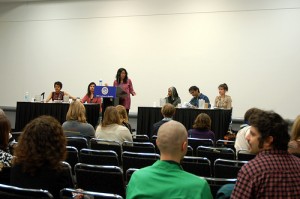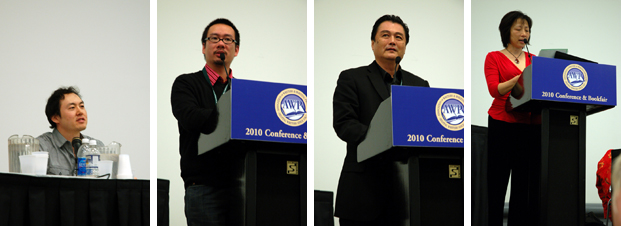To add to Iris’ reflections on our recent trip to Denver and this year’s AWP conference, here are a few additional thoughts, as well as some slightly more “reportorial” reflections on several of the panels that I most enjoyed. As this was my first time at AWP, I anticipated feeling completely overwhelmed by the sheer number of panels, readings, and discussions going on at all hours of the day, ranging from the future of M.F.A. programs in the United States to the apparent (or perhaps not-so-apparent) war between “hybrid” and traditional aesthetics in contemporary poetry. What I found, however, was that in the midst of these many conversations, a few distinctive threads began to emerge. Central to each of these threads was the question of community: how communities form around shared cultural, national, or transnational consciousnesses; how communities develop through shared aesthetics and/or poetic sensibilities; how communities emerge out of a drive to engage similar ethical and/or political concerns. My sense of poetry—or perhaps more accurately, my sense of those of us in the United States (and elsewhere!) who “do” poetry—as forming one large and vibrant community that extends across forms, aesthetics, cultural affiliations, and even national boundaries was deepened by all that I saw and heard while in Denver. Thanks so much to all those who welcomed us into their community at AWP.
Bollywood, Bullets, and Beyond: The Poetry of South Asian America
[Readings from Indivisible: An Anthology of South Asian American Poetry]

We were extremely lucky to attend this panel, which featured a stellar lineup of poets published in the brand new anthology of Asian American poetry Indivisible: An Anthology of South Asian American Poetry (University of Arkansas Press, 2010). We were thrilled to learn that the anthology, the first of its kind, had literally just been published and, hot off the press, was ready for purchase at the AWP bookfair. It was probably because of this that “Bollywood, Bullets, and Beyond” felt a little like a release party: poets gathering to celebrate the publication of this groundbreaking new collection, some of the editors and authors meeting for the very first time, voices coming to life from freshly minted pages . The presentation of this anthology featured readings by poets like Ravi Shankar and Monica Ferrell, to name just a few. As mentioned in reviews of the collection, Indivisible showcases “emerging and established poets who can trace their ethnic heritages to Bangladesh, India, Nepal, Pakistan, and Sri Lanka,” and represents a truly impressive range of voices and aesthetic styles. Keep an eye out for upcoming reviews!
Transnational Identities: Asian American Writers & Asia

Though not all the original panelists were able to make it, at this panel we heard writers David Mura, Wang Ping, and Ed Bok Lee offer their reflections on what it means to engage transnational Asian and Asian American prose/poetry as subjects with complex relationships to both Asia (ie. China, Japan, Korea) and the United States. Each writer shared not only from their personal experience of navigating the terms of transnational selves, or American ethnic selves, but from their writing as well, which pointed to many of the same questions addressed in their presentations. Toward the end of the session, we were especially grateful for the intimate feel of the panel as moderator Bao Phi encouraged audience members to actively participate in constructing a conversation around the questions of what it means to be Asian and/or Asian American, and how to explore the linguistic, aesthetic, and cultural complexities of this transnational identity… not to mention this transnational literary identity.
Before, After, Under, Over, Inside, and Beyond the Anti-War Poem
Easily one of my favorite panels at AWP this year, this discussion of the “Anti-War Poem” was moderated by Fred Marchant and featured poets Brenda Hillman, Nick Flynn, and Shanee Stepakoff, each of whom chose a different preposition (“inside,” “under,” “before,” or “after”), which they used to focus their reflections on the anti-war poem. Their high level of engagement—artistically, personally, and professionally—in examining issues of violence, torture, and the wide-ranging effects of the American war on terror led me to reconsider the role of the contemporary poet in what I now understand to be an America-at-war. Nick Flynn in particular drove home the point that because we are now writing in a nation at war, we are all writing war poems, whether we are aware of it or not, and are all affected by our country’s involvement in international warfare. What I most appreciated was the breadth of the conversation that took place at this panel; in addition to discussing the larger trends and exigencies of anti-war poetry today, the panelists also took time to reflect on salient features of their craft: techniques of redaction, the use of repetition and ordering in the amplification of found texts (ie. courtroom transcripts and the narratives of torture victims), the ethics of using testimonials and court transcripts as the raw material for poetry.